
I wrote about poverty before, here, in statistical terms, and in how they remain invisible in mainstream entertainments — at least in Hollywood — and when they appear in indi films, they are usually fetishized.
One thing that seems absent, too often, are the working poor. Statistically, there are 22 million people looking for full time work. Most work is part time, and temporary. That’s another hidden item in most government statistics on this topic.
Wages have declined, hours increased, and union power is almost non-existent.
Unions have been demonized in Hollywood, unless its a nostalgia project — (Sally Field as Norma Rae) — but an audience rarely connects that battle to their own relationship with management. Reagan ushered in an era waiting to happen — where union busting was seen as a sort of tough guy no-nonsense way to run a business. The trope changed. The tough union organizer was replaced with the tough manager, the tough owner of production, the Ayn Rand hero. Unions were gangsters or just filthy lazy moochers.
Union membership dropped another 3% again last year.
Outsourcing cost more jobs. Union workers were “too costly” (too costly for what?)….and the American working class was encouraged to blame immigrants, and foreigners for this rather than factory owners. And the few new jobs were mostly minimum wage. Seeing sixty year old women taking your order at KFC, or working as shop “girls”, or grey haired old gentlemen busing tables at the local cafe, is pretty common now. Capital focused on taking away dignity.
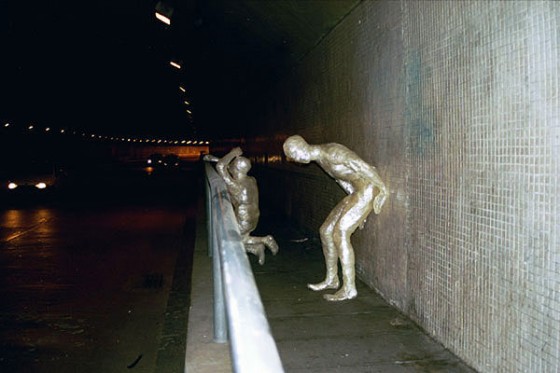
I was thinking about the very idea of nations, recently. About territory and borders, and about the history that drove these ideas, commerce, and transport, etc. The United States today, exercises economic domination, while also extending military exercises throughout the poor and developing world. The wars are there to make money for defense contractors, to secure oil and gas (and water, increasingly) but the real domination takes place via capital. The British tried a pseudo colonial model in India, and had a tribute paying client state ruled, however, by military force that was stationed in-country. The US is no different. Not really. The military extracts payment from countries like Iraq, but it also uses its military indirectly, and often covertly. The economic domination is backed up by the close to 1000 military bases worldwide.
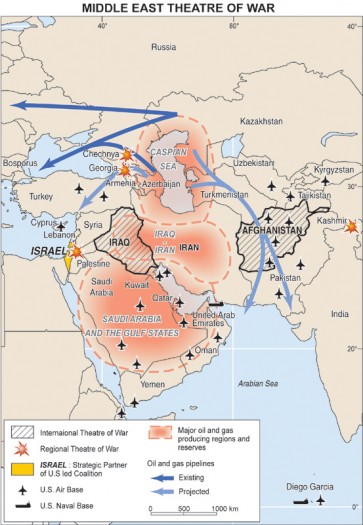
http://youtu.be/GvmUnu5-5oY
One of the problems with the Negri/Hardt vision of nation states in decline is that it’s simply not true. What HAS changed is that there is a perceptual deterritorializing that goes on in culture — a sort of strange absence of place. I remember watching The Bourne Tomato or whatever it was, one of the franchise pieces, and the action jumped from locale to locale, but without actually being anywhere. Part of this was achieved by the attention deficit editing and hand held camera (or steady cam). One never had time to process the image. All that was left were fractyls, shards of half image that contained enough signifiers for place (I saw a tuban….must be….wait….I know those weird yellow shoes…its Morocco)…..that one could track at least the basic plot outlines as they pertained to location — but the experience of deliberating on place was gone.
The idea of nation states declining and that some form of sovereignty exists in this post modern ‘nowhere’ empire is really to miss the actual material coercion that is rooted in actual nation states. The U.S. Empire compels state behaviors (obedience usually) from a globe of client states, mixed in with a recalcitrant few (China, Russia) and a handful of unruly resisters (Cuba, Venezuela). The compulsion exercised by the U.S. is acute, even if often indirect.
I suspect the nature of this “indirection” is a generating element in cultural product that reflects an absence of place. In ‘Spiderman’ we lack air, space, and in ‘Bourne’ we lack locale, and in a good deal of Television we are intentionally cast adrift in generic-land (often the generic show is filmed in Canada, doubling for the large American city). Fact is, Vancouver is not Seattle, and it’s certainly not New York or Chicago — but in a sense this is part of the homogenizing of place. The viewer is being trained to ignore the small nuances of an area, the historical traces of locale and the people of a specific place.
When a city is clearly established (with some exceptions, such as the doomed “Boss” with Kelcey Grammer…in which an actual Chicago could be seen) the rendering of this city is ahistorical. It is often never more ahistorical than when focusing on “history”. For its not history, its “history”.

The world is concrete: and low paying jobs are concrete, and sweat shops are concrete (and note that since the 1970s the definition of part time was expanded…allowing greater exploitation by management) and this materiality is rarely depicted in mainstream entertainments. The ways in which daily life is dominated by this exploitive system, the ways in which social relations reflect the dynamics of manager and worker, but in the most regulated manner, all serve to reinforce the idea of the state.
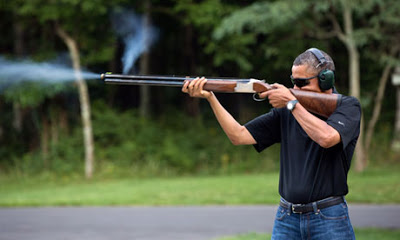
There is nothing immaterial in this. Globalization is capitalism first, everything else second. The entire apparatus of inequality is the result of the logic of capital — profit, accumulation, and commodification — the exchange value trumps use value. Still, the idea of territory, of states, can be opaque. What is not opaque is the violence that coerces these structures. It is a violence reflected in rape, both in the military and civilian sectors, in all domestic abuse, in all police actions, in the constant back drop of prisons and a corrupt judicial system. The state is opaque, but the coercion is not.
The compulsions to behave, to obey, are concrete and real. In fact, the control and compulsions visited upon the worker are part of what generated such an instensifying of passport regulations, border specifics, and a shared legal definition of the idea of territory. In fact, a brief note here on passports and movement. The legitimate right to travel, to move in or out of “country” as well as travel within one’s country, are more and more abridged today. Where as recently as the 1800s passports hardly existed, today the demand for ‘papers’ when attempting to exercise your legitmate right of movement, is systemic — it is, in fact, more and more authoritarian in practice. It is, however, important to note that Imperial Russia and even in England during the era of the Magna Carta, forbid all but peers of the realm and important businessmen from free movement.

People’s identity is welded at the base to the state and the issuance of identity papers. Birth certificate, social security card, or identity card, and passport. It is complex and interesting to view the history of passport control, as well as migrations and their effect on the evolution of the nation state. Karl Polyani pointed out that birth of the “poor” as a specific group took place during the industrial revolution in England (those not connected to the manor) — in other words, serfs without a landlord. This coincided with the birth of policing vagrants. If the modern idea of a nation grew out of the French Revolution, then the modern vision of population control seems to have grown out of the Industrial Revolution in England. Certainly control, as a principle, came from 19th century England. However, throughout feudal Europe, the poor, serfs, were always limited in their ability to move freely.
So, the passport today is international. You cannot leave or enter anywhere, not even your own country, without approval. Your passport must be stamped. Your ID checked, and of course these days, you will likely be searched if flying, and quite possible even if driving or traveling by car or train. Surveillance is a practice born of control, not protection. What has changed is that nations became institutionalized. The modern state is an institution, with vast bureaucracies and systems of information and data on its populace.

Historically, movement of populations is linked to two ideas: wealth (business, labor) and the military. Young men could be conscripted — the basis of armies in feudal europe (well, feudal anywhere) depended on having a good supply of military age men.
Its also good to remember that until the 19th century, the idea of travel was sort of abstract, if not mythic. The post feudal world of the 1880s, coupled to the inventions of transport at the time, raised an awareness, even among the poor, that movement was possible. The colonies existed, Australia, and far away lands in which one could make one’s fortune. Such grew the narratives connected to this age.

The 20th century emerged with a sense of protectionism for “citizens”. The preventing of brain drain, and of currency controls. Trade tariffs. Hobsbawm pointed this out, a sort of hard shell that intensified as fear intensified. John Torpey has pointed out the new gated communities internally, within nation states, reflect small fiefdoms privately regulated. State control, then, becomes local, privatized enclaves of the rich —while the wild boys snarl and forage beyond the gates. This is the new Carolingian Europe, in the Coachella Valley, or Carmel or The Hamptons.
The rise of sci-fi narrative that includes the collapse of state control, seems to suggest an almost desire for a new feudalism — coupled to the elite’s fear, as they manufacture this narrative — that if that happens, the serfs might overrun the walls.
The U.S, military now de-facto occupies much of the planet. It creates and coerces a string of compliant states, client states. The new development zones (Haiti, Honduras) are there as slave holdings, really. The belief that somehow this spreads economic health to these places is, of course, nonsense. It’s also, de-facto, more erasure of history. More destruction of community, and more control. The modern identity is increasingly one of inside or outside. But you can now be outside while staying inside.
As a sort of footnote, Henri Lefebvre’s “The Production of Space” (1974), was a pretty prescient analysis…
In the West, therefore, absolute space has assumed a strict form: that of
volume carefully measured, empty, hermetic, and constitutive of durational
unity of Logos and Cosmos. It embodies the simple, regulated and
methodical principle or coherent stability, a principle operating under the
banner of political religion and applying equally to mental and to social life.
This assumes material form in monuments which govern time by means of
well co-ordinated materials whose objective ordering – in terms of vertical
pressures and physical mass — successfully achieves both a natural and a
rational equilibrium.
History remained, the traces of social space, embedded in some fashion …but however one analyses these questions, the sense of totalitarian society, of social domination, which is reflected today in the corporate product that is mass entertainment, cannot be missed.
We already know several things about abstract space. As a product of
violence and war, it is political; instituted by a state, it is institutional. On
first inspection it appears homogeneous; and indeed it serves those forces
which make a tabula rasa of whatever stands in their way, of whatever
threatens them — in short, of differences. These forces seem to grind down
and crush everything before them, with space performing the function of a
plane, a bulldozer or a tank. The notion of the instrumental homogeneity of
space, however, is illusory — though empirical descriptions of space
reinforce the illusion – because it uncritically takes the instrumental as a
given.
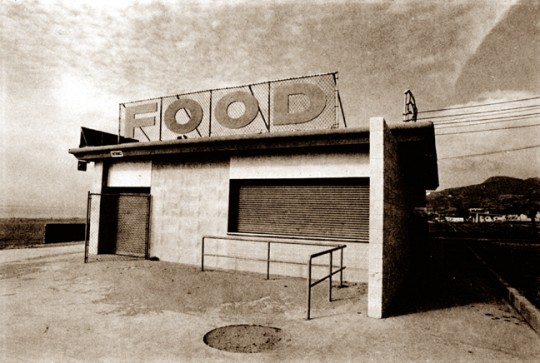
The questions of identity link to the creation of space by the state, and by the mechanisms and institutions of control now so established as to be seen as natural.
The U.S. economy depends on defense spending. Wars make a lot of money, and that’s more important than their cost, according to the logic of empire. The invention of abstract space, both psychologically, and materially, is a reflex adjustment to the need for control. It makes no sense that citizens cannot go wherever they choose, whenever they choose. There is no rational need to even have a passport, let alone other papers of identification. The international police state, with the U.S. military sitting atop it, is now in the process of creating internment areas (er…development zones) for the poor. Sweat shops, gated communities, check points, and more and more secret bases and prisons….that is the post industrial landscape.
Aesthetic resistance needs to question definitions of space, of identity, and reclaim those autonomous realms of reflection, silence, and history.
Lefebvre again:
“The aforementioned contradiction between the global (the capacity to
conceive of and deal with space on a wide scale, even on a world scale, as in
the cases of computer science and the geopolitics of air transport) and the
fragmentary (the subdivision of space for purposes of buying and selling)
intensifies at the strategic level. In strategic spaces resources are always
localized. Estimates are made in terms of units, whether units of production
(firms) or units of consumption (households). Objectives and ‘targets’, by
contrast, are always globalizing in tendency, and effectively worldwide in the
case of the chief states and chief transnational corporations. Dispersion and
subdivision, often carried to the point of complete segregation, are controlled
and dominated by strategic aims, by wills-to-power of the highest order in
terms both of the quantity of means employed and of the quality of goals
pursued. Everything that is dispersed and fragmented retains its unity,
however, within the homogeneity of power’s space; this is a space which
naturally takes account of the connections and links between those
elements that it keeps,paradoxically, united yet disunited, joined yet detached from one
another, at once torn apart and squeezed together.”
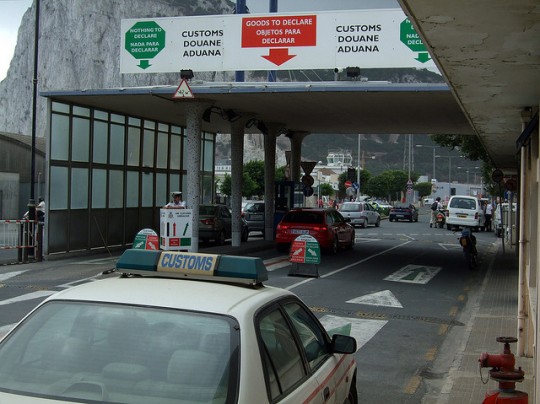

Interestingly, this (as it is going on around most of the ‘West’) is becoming a hugely heated topic here in Britain, that is, the concept of ring-fencing the Island! “WE ARE NOT EUROPE!” the decry! LOL – Nationalist insanity. Whilst the EU has its problems ( and big ones at that ) I think it is better for Britain to be in it than out of it ( especially since our laws haven’t been upgraded since 1866!)